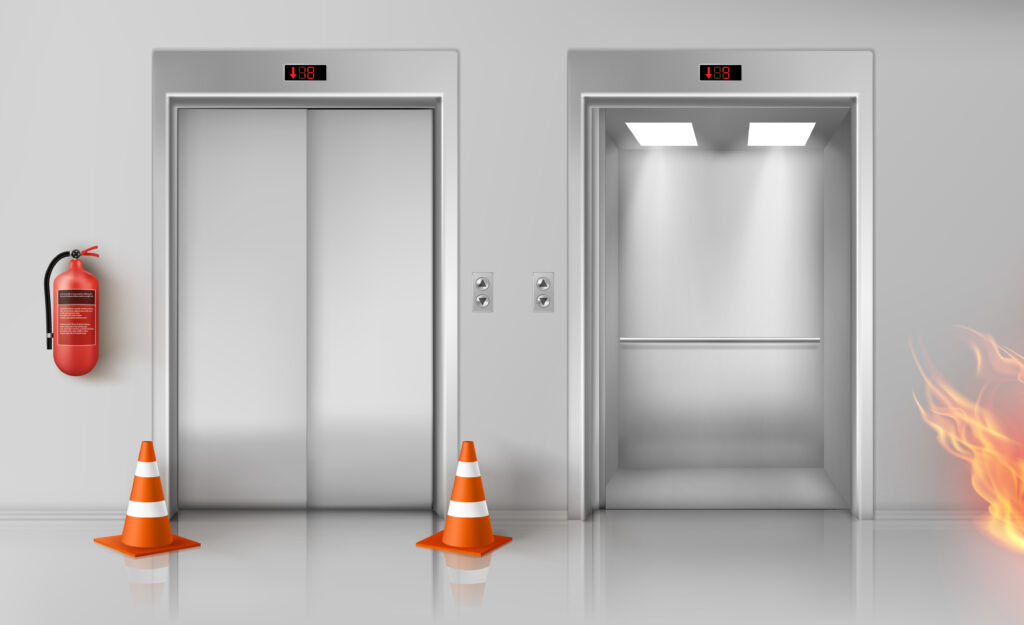What is an elevator accidents? How serious an elevator accident can be?

Fire in office hallway with open and closed elevator doors, red extinguisher on wall and traffic cones. Vector realistic illustration of emergency in empty lobby interior with lift
Elevator accidents are a relatively common occurrence, yet many people remain unaware of the risks associated with these incidents. Elevator accidents can range from minor inconveniences to serious incidents involving injury or even death. In this blog post, we discuss what elevator accidents entail, the potential consequences of these types of incidents, and how to protect yourself against them. Read on to learn more about why elevator safety should be taken seriously and what steps can be taken for prevention.
1. What is an Elevator Accident?
An elevator accident is any incident that causes damage or injury due to negligence, malfunctioning or other factors impacting an elevator. This includes incidents that occur while an elevator is in motion, such as collisions between an elevator car and the building’s walls, floors or other surfaces. Elevator accident can also be caused by faulty wiring and defective parts, improper maintenance of the machinery, and user error. In some cases, a mechanical failure may be responsible for causing the accident. Regardless of what caused the accident, if it resulted in injury or damage then it is considered an elevator accident.
2. Types of Elevator Accidents and Injuries
Elevator accidents can cause serious injuries, such as broken bones, head trauma, spinal cord injury, amputation and even death. New York Faulty Maintenance Elevator Accident Lawyer can help you get compensation for your physical and mental damages.
Legally speaking, elevator accident can be classified into two distinct categories: passenger-on-elevator accident and passenger-off-the-elevator accident. In a passenger-on the elevator accident, a person may suffer personal injury while they are inside the elevator car. In a passenger-off the elevator accident, a person may suffer an injury because of something that happened in association with the elevator but not necessarily while they were inside it – for example an object falling off an overhead lift or improper wiring around the area of the lift.
Read Also: A Comprehensive Guide to Negotiating a Settlement After a Car Wreck in Houston
3. Causes of Elevator Accidents
Elevator accidents can occur for a variety of reasons, including user errors such as failing to follow the manufacturer’s instructions when operating the machine, malfunctioning parts, lack of maintenance or improper maintenance, and defective wiring. The vast majority of elevator accidents are caused by mechanical or electrical failures, which can range from minor to catastrophic. In some cases, an elevator car may be overloaded beyond its carrying capacity, leading to an accident. Faulty wiring or other safety concerns can also lead to hazardous conditions and potential injury. Finally, negligence on the part of building owners and operators can lead to a dangerous elevator accident.
4. How to Avoid Elevator Accidents
The best way to avoid elevator accidents is to make sure the machine is properly maintained. Regular maintenance should be conducted by qualified technicians, and elevator manufacturers should be consulted if repairs are needed. Additionally, those who operate elevators should take extra precautions such as inspecting the area for any potential hazards before entering the elevator. Building owners and operators must also ensure that occupants follow safety protocols and use the appropriate amount of care when operating elevators. Furthermore, if there are any problems or issues with an elevator, it’s important to report them promptly to a service technician.
5. The Seriousness of Elevator Accidents
Elevator accidents can cause serious injury or death, and those that do survive may be left with long-term physical or psychological problems. Even a minor elevator malfunction can lead to a devastating event, as the machinery is incredibly dangerous when it malfunctions. In addition to causing severe physical trauma, elevator accidents can also lead to emotional trauma due to the fear of being trapped in such a confined space. It is therefore important for building owners and operators to take all necessary safety precautions in order to ensure that elevators are running safely and properly at all times.







